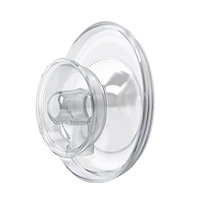How much sleep is normal for a baby?
It’s perfectly normal for a newborn to spend most of the day sleeping. While this will be spread across multiple short sleep cycles of around 30-60 minutes each, during the first 0-3 months most babies sleep for a total of between 14 and 18 hours every day. They’ll often sleep for around 8-9 hours during the daytime and roughly the same at night.
When they get a little older (usually from around 8-12 weeks), they won’t require quite as much sleep, but they’re still likely to spend 12-16 hours a day snoozing. This will usually involve a slightly more predictable daytime nap schedule (3-4 naps during the day, for example) and they should (thankfully) start sleeping for longer stretches at night — possibly up to 6-8 hours.
Is it possible for a baby to sleep too much?
Yes. Babies require plenty of sleep for brain development and physical growth, but it’s also important that they spend enough time awake and alert for things like feeding and bonding.
While it’s quite rare for a baby to sleep too much — and sleeping a little longer than normal isn’t usually anything to worry about unless they’re showing other symptoms — if they’re snoozing through their normal feeding times, unusually difficult to wake, or struggling to gain weight, this could indicate an underlying issue.
You certainly don’t want to get into a pattern where your baby sleeps through and misses their daytime feeds, and is then awake for most of the night as a result. Newborns especially can sometimes be sleepy around their regular feeding time, but it’s important to fully wake them to take a good milk feed.
Generally, though, as long as your baby is feeding, peeing, and pooping regularly — and they’re not displaying any signs of illness — you don’t have too much reason to worry, even if they’re occasionally sleeping a little longer than you might expect.
It’s also important to remember that all babies’ sleep needs are different and often changeable. They may simply be more tired on a particular day because there’s more going on, for example, and therefore require a touch more daytime sleep.
How much sleep is too much for a baby?
While it’s normal for a newborn to spend up to three-quarters of their day sleeping, it’s quite uncommon for them to sleep for more than 19 hours in a 24-hour period.
Sleeping for this long doesn’t necessarily mean there’s an issue — it’s not completely unheard of for newborns to sleep for up to 20 hours — but it might be a concern if they’re missing feeds or not gaining weight as they should (keeping an eye on their number of wet and dirty diapers is a good indicator of whether they’re hydrated and well-fed).
As your baby gets older, their sleep needs will decrease. By the time they reach 3 months old, for example, you shouldn’t expect them to be sleeping as much as they did when they were fresh out of the womb — at this stage, it’s pretty rare for them to need more than about 16 hours of sleep, while around 3-4 daytime naps should usually be enough.
Can a baby sleep too much during the day?
Yes, but this is generally only a concern if it affects their nighttime sleep pattern or feeding schedule. Babies, especially newborns, have a natural need for a lot of sleep and daytime naps are essential for their development, but too much sleep during the day can interfere with establishing a consistent nighttime routine.
For babies older than a few months, excessive daytime sleep may disrupt their circadian rhythms. If your baby is sleeping for longer stretches during the day, it might make it harder for them to settle and sleep for long stretches at night — if this is the case, it can help to gradually reduce their daytime naps to ensure they’re well-rested but not oversleeping.
Can a baby sleep too much at night?
Generally, it’s less of a concern for a baby to sleep for long stretches at night, especially as they grow older and their sleep patterns mature. In fact, for babies over 3 to 4 months, sleeping longer at night is usually a sign of healthy sleep development.
For newborns, however, it’s important to ensure their nighttime sleep doesn’t interfere with their feeding needs. Newborn babies typically need to wake every 2 to 4 hours to feed, especially in the first few weeks, so it may be necessary to wake them to make sure they’re feeding regularly.
Once they’re back at their birth weight, otherwise healthy, and signed off by your pediatrician or midwife, you can normally let them sleep for longer at night and focus more on waking them for feeds during the day.
Is too much sleep bad for a baby?
Sleeping a little too much generally won’t do your baby any harm unless it interferes with their feeding schedule or is linked to an underlying health issue. For newborns, sleeping through feeds can impact their growth and weight gain, while if you’re finding it unusually difficult to wake them this could be a sign of something like jaundice or low blood sugar.
Older babies tend to sleep in longer stretches, especially at night. But if they’re sleeping too much during the day, their natural body clock can be thrown off, meaning it might be more difficult to get them to settle at night or they might wake more frequently.
In most cases, your baby sleeping too much is only really a concern if any of the following are true:
They’re missing feedings. Newborns, in particular, need to feed every 2 to 4 hours, and if they’re skipping meals because they’re sleeping too much this can inhibit their growth and development.
They’re not gaining weight. If your baby is sleeping for long stretches and doesn’t seem to be putting on enough weight, it could be because they’re sleeping too much and not getting the nourishment they need.
They’re unusually lethargic. If you find that your little one is not only sleeping a lot but they’re often drowsy and difficult to wake, this could be a sign of an infection or a condition such as jaundice.
They’re not sleeping at night. Newborn sleep patterns don’t tend to be impacted by day and night, but babies older than a few months might struggle to sleep at nighttime if they’re getting too much sleep during the day.
Is my baby sleeping too much?
As we’ve said, you don’t usually need to concern yourself with whether your baby is sleeping too much unless it’s affecting their normal feeding routine (which might mean they’re also struggling to gain weight) or you think it might be a sign of something health-related like jaundice or an infection.
If you’re worried that your little one is oversleeping, it’s always a good idea to book an appointment with a pediatrician to rule out any underlying causes, but there are also a few telltale signs you can look out for that might indicate your baby is more than just a sleep addict.
Signs your baby might be oversleeping
Difficulty waking up. If your baby is consistently hard to rouse from sleep, especially when they’d usually wake to feed, this could be a sign that they’re sleeping more than they should be.
Lack of movement during sleep. Newborns spend around 50% of their snoozing time in active sleep, where it’s common for them to be restless and fidgety. If your baby seems too still for prolonged periods, they might be sleeping for too long.
Fussiness during wake windows. If your baby seems uncharacteristically drowsy, irritable, or disinterested in between naps, they might be sleeping too much because of an underlying condition like jaundice.
Fewer messy diapers. If your baby is sleeping so much that they’re missing their regular feeding times, you may find that you have fewer wet or dirty diapers to change. A lack of sufficient weight gain can also be an indicator of this.
Why is my baby oversleeping?
Babies can oversleep for all sorts of reasons, and it’s not always a sign of anything untoward. Their growing bodies may require more sleep on some days than others, for example, or they may simply be worn out because they’ve had a particularly “busy” day.
Of course, there can be health-related reasons for oversleeping too, and it’s important to keep an eye out for any signs or symptoms of these.
Here are some of the factors that might contribute to excessive sleep:
Growth spurts. Babies go through several stages of rapid growth in the first year of their lives, and more rest is often required to fuel this growth.
Illnesses and infections. Just like adults, babies who are poorly need rest to help them recover. A condition such as jaundice or a cold might make them more sleepy than normal.
Low blood sugar. Babies who are not feeding often enough or have issues with their blood sugar levels might sleep more because they’re lacking in energy.
Medications or vaccinations. Increased sleepiness can be a side effect of some medicines, while vaccinations can also cause babies to sleep more than normal.
Overstimulation or exhaustion. If your baby has been overstimulated or more active than usual — perhaps they’ve had lots of visitors, for example — they may simply need more sleep because they’re pooped!
What to do if your baby is oversleeping
If you think your baby is oversleeping and therefore undertired, the first thing to do is not panic: while it can be concerning, there may be a perfectly innocuous reason for them clocking up a few more Zs than normal, and it doesn’t always mean there’s an underlying health issue.
Professional advice is always your best bet, but there are also a few things you can do to a) ensure your baby’s excessive sleeping isn’t affecting their development or the result of a health problem, and b) help your baby maintain a healthy sleep pattern that encompasses enough — but not too much — daytime and nighttime sleep.
Make sure they’re feeding regularly. The most important thing is to ensure your baby isn’t sleeping through important feeding times, especially when they’re a newborn. Newborns should feed every 2-4 hours; if they’re oversleeping and missing feeds, try waking them up gently during lighter stages of sleep.
Monitor their weight gain. It’s important that your baby isn’t sleeping so much that they’re undernourished. Check that their weight is roughly normal for their age. If it is, there may be no cause for concern; but if they’re underweight, they may be sleeping too much and not feeding regularly enough.
Check for signs of illness. In some cases, oversleeping could indicate that your baby is feeling unwell. If they seem lethargic or are difficult to wake up, check for other symptoms such as a high temperature. Symptoms such as yellowy skin or eyes, dark urine, and pale-colored poo could be signs of jaundice.
Create a consistent sleep routine. Though it’s often easier said than done, setting a regular sleep schedule and trying to put your baby down at roughly the same time each night can help ensure they’re getting enough sleep at nighttime and not sleeping excessively during the day.
Limit daytime naps. For older babies, keeping naps at a reasonable length can help ensure they don’t oversleep during the day and disrupt their nighttime slumber. Babies’ nap schedules typically shorten as they get older, and from 6 months onward you can usually limit them to just 2-3 daytime naps.
Consult a pediatrician. If you’re at all concerned about the amount your baby is sleeping (particularly if it’s impacting their feeding or weight gain) it’s always a good idea to seek some medical advice. A pediatrician can assess whether your little one’s sleep patterns are normal or a sign of a hidden issue.
Should I wake my baby if they’ve overslept?
It may be necessary to wake your baby if they’ve been sleeping for too long, especially if they’re a newborn and overdue a feed. Newborns tend to need feeding every 2-4 hours, and leaving them to sleep and miss a feed can hamper their growth and development — and sometimes lead to them not gaining weight quickly enough.
If your baby is 3 months or older, you might consider waking them from a daytime nap if you think they’re oversleeping. Allowing extended naps during the day can disrupt their natural sleep-wake rhythms and make it more difficult for them to sleep for long stretches at night — which isn’t always that fun for your baby or for you.
If you do decide to wake them, try to do so when they’re in a lighter stage of sleep. Like adults, babies go through different sleep cycles, and waking them when they’re in light (or more “active”) sleep — often characterized by slight movements, fluttering eyelids, or irregular breathing — will usually be less disruptive or startling.
More often than not, your baby’s extra sleep is nothing for you to lose sleep over. Babies grow, develop, and heal while they rest, and sometimes they just need a little more shuteye. But if their sleep is affecting their feeding, weight gain, or they’re showing signs of illness, it’s always a good idea to seek professional advice.
Remember, every baby’s sleep needs are unique and continually evolving, and finding their perfect sleep balance is a learning process for both of you. Now, it must be time for a nap…
Reviewed by Sleep Consultant, Rosey Davidson in November 2024.











 12 minute read
12 minute read